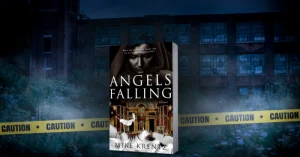Angels Falling
“How many angels must fall to spare one human life?”
Criminal profiler Pete Sullivan knows evil. When the disgraced ex-seminarian responds to a murder scene at a cathedral, he’s certain nothing can shock him. But the moment he steps into the gruesome carnage, the archbishop’s ritualistic murder leaves him reeling.
Pete steels himself to do his job, but he must partner with a person from his past. Her mercurial behavior complicates the investigation. Pete follows clues to another sensationalized crime that could lead to more tragedy.

© Reprinted by permission. All rights reserved.
Prologue
Death is underrated. . . .
Kill or die? That is the question. Live to kill. Kill to die. Surcease of sorrow? Not. Death never kills me.
My soul from out that shadow? Shall death die? Balm in Gilead?
Nevermore.
. . .
Chapter One
Reuel removed the bloody, oil-stained latex gloves and stepped back to admire his handiwork. Perfect. He swept his gaze around the sanctuary of St. Matthew’s Cathedral then glanced toward the Chapel of the Holy Angels in a loft to the right. After trading the dirty gloves for a fresh pair from the roll-aboard case, he extracted a fourteen-inch statuette and placed it near his victim’s head. He turned the statuette a few degrees so that it faced the dead man’s heart.
Satisfied, he retrieved his upper clothing from atop the altar, put on a black clerical vest over his blood-stained tee shirt, adjusted the Roman collar in front, donned a black suitcoat over the vest, and placed a black fedora on his head. He paused at the feet of the dead archbishop, made an exaggerated sign of the cross in the air over the corpse, and spoke in a mocking voice. “Kyrie eleison, Christe eleison, Kyrie eleison. Lord have mercy. Christ have mercy. Lord have mercy.”
He grabbed the suitcase, made a last check for telltale clues, and left the cathedral by the side door he had jimmied hours ago. He departed forty minutes before the scheduled opening for Sunday morning Mass.
. . .
Chapter Two
Pete Sullivan glanced at his smartwatch as he passed the six-mile marker of the Marine Corps Marathon. Nine minutes, thirty-eight seconds per mile. He needed to average nine-minute miles to meet his goal of finishing in four hours or fewer.
Don’t push it. Twenty miles to go. Pick up a few seconds each mile. Save energy for the sprint at the end. Pete opened and closed his hands in sync as he pushed his legs to speed up.
Just a bit faster. . . .
The seven-mile marker heralded the turnaround point about a half-mile ahead on the steepest incline of this segment of the course. He looked forward to several miles of downhill to get his pace closer to that nine-minute mile.
An annoying beep in his ear.
Crap.
Without breaking stride, Pete pulled his phone from his fanny pack and hit Answer.
“What?” He panted into the phone to emphasize being bothered by the interruption.
A somewhat familiar male voice answered. “Pete Sullivan?”
“Yeah.” More panting.
“Tony Mason, FBI.”
Deflated, Pete breathed into the phone as he continued running, his pace slowing against his will. “What do (pant) you want?”
“You. How soon can you get to St. Matthew’s Cathedral?”
. . .
Chapter Three
Maria Santos felt her attacker’s breath on her hair a second before his hands encircled her throat. Before he could gain purchase and squeeze her carotid arteries, she reached up with both her hands to grab behind the assailant’s thumbs. She flexed her knees as she yanked his hands off her neck and swiveled her hips to her right. She held his left hand in a tight grip over her shoulder as she pivoted, forcing his right hand down from her neck. She took a quick step to her left, released the attacker’s right hand, and used the full swinging momentum of her right arm to smash her open hand into his groin. As he doubled over in immediate pain, her upswinging right elbow smashed his chin. She used his left arm as leverage to pivot and bring her left knee hard against the man’s chest. His torso sprang upward.
As she advanced to deliver more blows with her fists and knees, he stepped back, brought both arms to his side, and bowed.
Maria mirrored his movement.
Beside the dojo mat, Liam Solnitz clapped his hands. “Strong work,” her instructor said. “Could be quicker. Try it again with a larger adversary.” Liam tapped his chest before bowing and stepping onto the mat.
Maria glanced at the three other women and two men in the Krav Maga class. Two women threw her knowing smiles.
Why do I have to be the object of Liam’s boyish crush? It seemed unbecoming for a man nearing fifty; ten years older than her.
. . .
Taking a longer route to avoid where she thought the marathon course
might be, she arrived back at her apartment ten minutes later than planned. When she unlocked the front door, a peculiar sensation washed over her. As if someone was with her. She shook it off. Not the first time her mind tricked her. She dropped her workout bag in her bedroom, threw her gym clothes into the hamper, and headed for the shower.
After the shower, Maria stood in front of the mirror over the sink and
dried her long black hair with a second towel. She reached for her hairbrush, but her fingers closed on nothing. The brush was not in its usual spot on the counter just to the right of the sink. She found it a foot away, nearer the toilet.
“That’s odd,” she said. She always put the brush in the same place. Then she recalled her morning rush to get to her Krav Maga class.
Must have dropped the brush in the rush.
The phone rang in her bedroom. She answered it, holding back her
still-damp hair as she held the phone to her ear.
“Dr. Santos?” Female voice, serious.
“Yes?”
“This is Detective Louise Vandermark, Metro Police.”
A chill shot up Maria’s spine. Did I do something I don’t remember? Again?
Her voice quivered. “Okay.”
“I’m lead investigator for a murder that took place this morning at St. Matthew’s Cathedral.”
back to Top
“Gripping, scary and utterly unique.”
—Stella Cameron, New York Times bestselling author
“ANGELS FALLING is modern Gothic at its twisty, character-driven best. Walks the tightrope between psychological suspense and sheer madness without losing its balance.”
—Jayne Ann Krentz / Amanda Quick, New York Times and USA Today bestselling author
“A master of psychological suspense, Mike Krentz’s characters are never who they first seem. Krentz takes his readers on a tense, gripping journey across decades and countries to explore the darkness deep inside the human psyche.”
—Kelly Sokol, award-winning author of THE UNPROTECTED
Meet Pete and Maria

Excerpt from ANGELS FALLING © Reprinted by permission. All rights reserved.
Pete and Maria find themselves assigned to the task force investigating the archbishop’s murder. They haven’t seen each other in over twenty years. . .
MARIA LOOKED AT PETE, EYES WIDE, BUT SAID NOTHING.
Pete reached out his hand. “Long time no see.” He cringed inside at his triteness.
She left his hand hanging in the air, stepped away from the doorway, and turned down the hall. Pete fell into stride next to her. He reminded himself that she’d never known his past feelings for her.
After walking ten steps, she stopped and turned to him, her face a frozen mask. “When I saw you at the cathedral, I hoped I was mistaken.”
Conflicting emotions stormed inside him. Twenty-some years contracted to minutes. Maria looked the same as he remembered, and different. The beautiful girl-nun he’d cherished had become a mature, attractive professional.
“I must go.” She turned to walk toward an elevator.
“Wait.” The word had escaped his mouth without clearing his brain first. She slowed, hesitant. Pete caught up with her. “We should talk.”
Maria stopped and faced him. She swept a strand of black hair off her face, swallowed. “No need,” she said. “I won’t be on the task force.”
Pete’s heart jumped. “Why not?”
“They don’t need both of us. I have an active clinical practice . . .” Her words trailed off.
He tilted his head, squinted at her. “This case is so bizarre; the task force will benefit from both our expertise.”
She looked at the floor, shoulders slumped.
“Is that the real reason, or do you not want to work with me?”
She pursed her lips, looked at him askance, shrugged.
“Can we discuss it?”
Maria stared past him; forehead wrinkled then smooth. “Okay, but . . .”
“Let’s go somewhere to talk.” He gestured at an open door leading to a vacant office. Maria nodded.
Pete led her into the empty room. She left the door open. He turned to face her. At six-five, he was almost a foot taller, so he stepped back to not appear threatening. At the same instant, she took a step back.
Pete fumbled for words. “I’ve never heard you speak English.”
She looked away. “One of many things I had to learn.”
“You seem to have done all right since . . .”
“Thanks to a wealthy physician and his family that took me in as their own.” Her guarded eyes scrutinized him. “You seem okay.”
“Yeah. Long road back, but, you know, poco a poco.”
Maria looked past him, nodded. “De veras.”
They stood apart, neither speaking, neither moving. When the silence became uncomfortable, Maria spoke without looking at Pete. “You’re FBI? I haven’t seen you before today.”
Pete shook his head. “Not an agent. I couldn’t pass the background check; because of that, uh, incident.” He glanced at the floor. “After I left . . .” He looked up to meet her eyes. “After I was forced out of the seminary, I knocked around in Arizona and California for a few years before I got myself together and went back to college. Got a degree in criminology then turned to profiling. Ended up back in El Paso. Moved here two years ago to teach at GW. FBI doesn’t mind using me as a freelance profiler. It works.”
Another long silence. Needing to end it, Pete said, “You?”
She shook her head. “I’m a practicing psychologist. Sometimes I support DC and other local police departments on forensic psychology.”
Pete dared not ask how the disgraced Mexican nun he knew years ago in El Paso showed up in his DC life as a forensic psychologist. She would have told him if she wanted.
They stood in place, each lost in thought.
Pete broke the silence. “How do we work together on this case?”
“Not sure we do.”
He tried a smile. “Don’t say the case doesn’t interest you.”
Her tone lightened; eyes bright. “Like none other in my career.”
“What would it take to convince you to stay on it?”
Her eyes flashed. “Start by not talking over me or mansplaining everything I say after I say it.”
Taken aback, Pete raised his hands. “Sorry. No offense intended.”
“Never is.” Maria smirked. “I may be over-sensitive.” She raised both index fingers to make air quotes. “Small woman syndrome.”
Pete chuckled. “Never heard that one. Short man, yeah, but never small woman.”
Maria smiled for the first time. “I’ve been accused of worse: ‘small hot-tempered Latina syndrome.’”
Pete shook his head. “Not in this case. I do talk over people. Bad habit. Small women or heavyset men. I’m an equal opportunity mansplainer.”
She laughed. “Okay, hombre.”
“Seriously, I’m sorry.” He paused. “I will do my best to stop my annoying habits, especially if it means you’ll stay on the case.”
Maria looked away. “I don’t know.”
“Look,” he said. “I get it. It will be a challenge, given our history.”
“So long ago. I’d gotten over it.” She gazed at him; eyes sincere. “The last couple of hours have been like a return to hell.”
“Yeah. For me too.”
She looked away.
Pete blurted the question foremost in his mind. “Gabriel?”
Her face clouded over. She shook her head. “Yes, Gabriel.”
“Did you see him that night?”
“Long story. Not for now. Probably for never.”
Another long silence. This time Maria broke it, posture at once erect, eyes making solid contact with his. She reached out her hand. “Okay. We work as a team, share information, coordinate input; and the past stays in the past.”
Pete shook her hand. “That works.” He smiled. “Thank you.”
They left the room and walked toward the elevator. Pete said, “I’ll see you at the autopsy?”
Maria did not hesitate. “Sure.” She preceded him into the elevator.
Meet Gabriel

Excerpt from ANGELS FALLING. © Reprinted by permission. All rights reserved.
AWAKENED BY A MIGRAINE HEADACHE, Father Gabriel Valentine arose in careful, practiced movements to keep the pounding in his head from erupting into full-blown agony. In the bathroom, he swallowed his prescription medication with a full tumbler of water then padded back to bed with a cold washcloth to cover his eyes. Laying on his back, he recited the Lord’s Prayer in comfortable Latin.
“Pater noster, qui es in caelis . . .”
Sixty minutes later, as if to an alarm, Gabriel sat up in bed. A mild sense of nausea and vertigo—as if on a boat in rolling seas—replaced the pain in his head. He arose and began his morning routine, following each meticulous step in a ritual that never varied. Kneel at bedside. Pray. Morning toilet. Seventeen-minute shower timed to the second. Shave. Clean and disinfect shower tile, toilet, sink, mirror.
Back in his bedroom he put on fresh white underwear and tee-shirt, pressed black trousers, black socks, and polished black shoes. Next, he donned his starched Roman collar and a clean black cassock of the traditional full-length cut with thirty-three buttons from collar to hem—symbols of Christ’s years on earth. Each button took a second and a half to close—forty-nine seconds in all.
Inspecting his portly frame in the full-length mirror, he leaned in to rearrange an errant strand of black hair. Satisfied with his monsignor-like appearance, he stepped onto the front porch of his two-bedroom single-level ranch house, known as a “rectory,” to watch his flock arrive for Sunday Mass.
The single women emerged in single file through a door in the middle of their building. Each wore a light-blue, full-length loose dress and modest white veil. Behind the first eleven, the last woman shuffled along on her knees. An area of shaved scalp peeked out from beneath her veil. When she saw Gabriel looking at her, she bowed her head and scuffled the rest of the way with eyes fixed on the ground.
From the mirror-image building on Gabriel’s right, the twelve young men emerged, each wearing navy-blue trousers and long-sleeved buttoned-up white shirts. Skull caps topped their heads. They waited with silent respect for the women to pass, then fell into step behind them. The last man shuffled along on his knees, his skull cap revealing a shaved head. Without looking at Gabriel, he kept his gaze fixed on the ground as he moved along behind his fellows. No one spoke, in keeping with Gabriel’s mandate of absolute silence on Sunday mornings until after Mass.
As he watched the man and woman trudging on their knees, he decided to release them after Mass from their kneeling penance. He would show them loving mercy and also reinforce the lesson about the inviolable nature of his rule against singles fraternization. The slow regrowth of their hair would be a lingering reminder for several weeks.
Behind the single members, several of the dozen families that belonged to his community walked the short distance from a cluster of single-family housing just beyond the front gate of the compound. Most adults in these families were middle-aged or younger, but several gray-haired elders had also joined his congregation; drawn by the old ritual that recalled for them the habits of their youth in the true Catholic Church. The families with children had no more than two in tow, following another of Gabriel’s rules. All family members were white, no minorities, and they wore modest clothing from the racks at Wal-Mart or Target.
Gabriel’s followers nodded silent greetings to their pastor as they passed. A few parents shushed their younger children who hadn’t gotten or understood the message about pre-Mass silence. Gabriel smiled at them to communicate his pleasure, and patience, with their efforts to control their offspring.
Once his followers entered the church, Gabriel crossed the small courtyard between his house and the church. Sixty-three steps from his door to the church entrance. As always, at step thirty-one, he paused and nodded in reverence to the life-sized statue of Mary, Lady of Lourdes, in its honored place atop a wide concrete base. He walked around the side of the church to the sacristy that connected the church to the rectory. More like a large hallway, the sacristy functioned as a dressing and supply room where the priest could prepare for Mass. It had other functions as well, but Gabriel never spoke of those.






